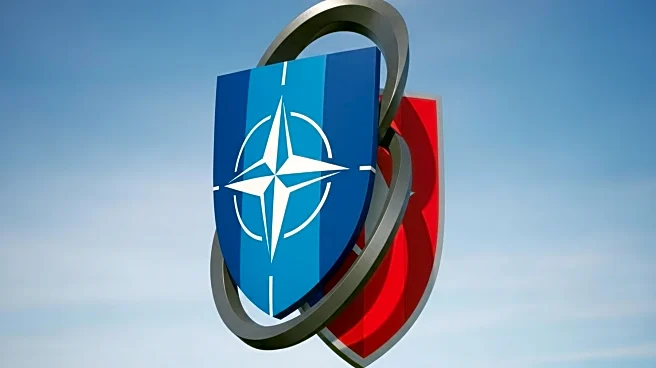What's Happening?
President Donald Trump has expressed a significant shift in his stance regarding the ongoing conflict between Ukraine and Russia. On September 23, President Trump stated that he believes Ukraine can reclaim all territories lost to Russia, with the support of NATO. This marks a departure from his previous calls for Ukraine to make concessions to end the war. The statement was made following a meeting with Ukrainian President Volodymyr Zelenskyy during the United Nations General Assembly. This development indicates a potential change in U.S. foreign policy towards a more supportive role for Ukraine in its efforts to regain control over its territories.
Why It's Important?
The change in President Trump's position could have substantial implications for U.S. foreign policy and international relations. By supporting Ukraine's territorial ambitions, the U.S. may strengthen its ties with NATO allies and reinforce its commitment to European security. This could lead to increased military and diplomatic support for Ukraine, potentially altering the dynamics of the conflict with Russia. The move may also influence U.S.-Russia relations, as it signals a more assertive stance against Russian territorial expansion. For Ukraine, this support could bolster its efforts to reclaim lost territories and enhance its strategic position in negotiations.
What's Next?
Following President Trump's statement, there may be increased diplomatic and military coordination between the U.S., NATO, and Ukraine. This could involve discussions on providing additional military aid or strategic support to Ukraine. The U.S. and NATO may also engage in further diplomatic efforts to rally international support for Ukraine's territorial recovery. Additionally, Russia's response to this shift in U.S. policy will be closely monitored, as it could impact future negotiations and the overall stability in the region.
Beyond the Headlines
This development may also have broader implications for global geopolitics, as it reflects the ongoing tensions between Western powers and Russia. The U.S.'s support for Ukraine could be seen as a reaffirmation of its commitment to uphold international norms and territorial integrity. It may also influence other countries facing similar territorial disputes, encouraging them to seek international support for their claims. Furthermore, the situation highlights the complex interplay between military alliances, national sovereignty, and international diplomacy.










